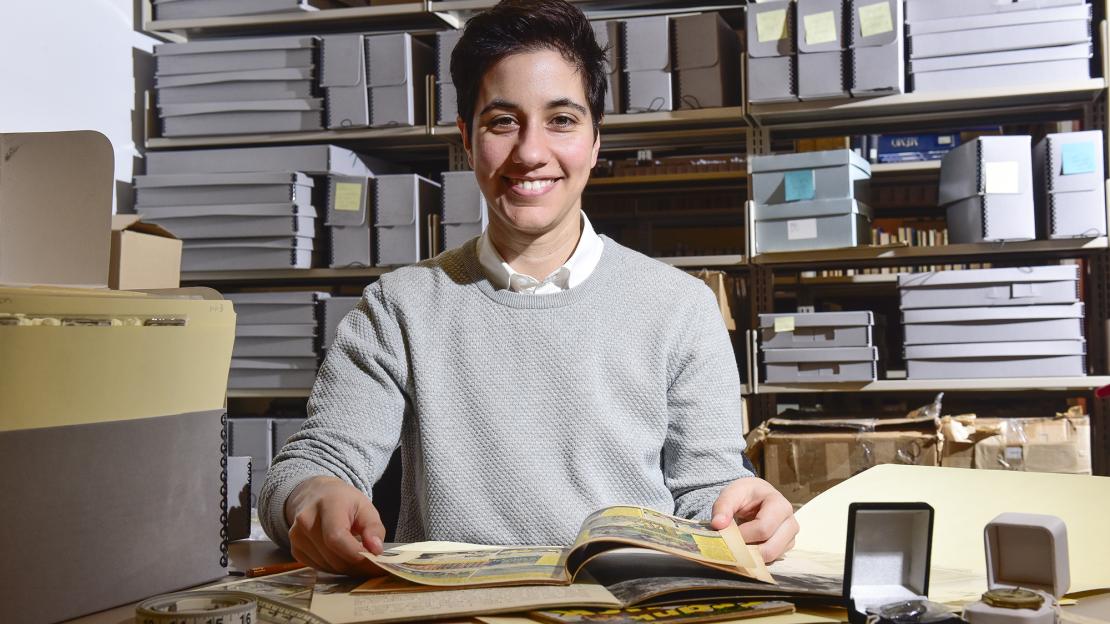Archivists collect, preserve and help others access all kinds of records. In the past archivists solely relied on physical documentation, storage and organization, but UTSC Library’s new archivist Tanis Franco welcomes the present and future of digital archives.
Franco, who has worked in archives at Columbia and McGill University, is interested in the way that digital and physical documentation continues to intersect in their field.
Writer Raquel Russell spoke to Franco about their role, what interested them in archival work and a new UTSC Library collection that is sparking conversation.
Why did you decide to become an archivist?
Back when I did my Master’s in Library Studies, I knew that I wanted an academic career in research that somehow related to the arts, whether it was in a library or an archive.
My first job out of my Master’s in Library Studies was in a museum archive, and that experience helped form my decision. There was no end to the fascinating material that you got to see and learn from.
What’s one thing about being an archivist that might surprise students?
There’s a traditional image of an archivist, perhaps, that we work in dusty basements wearing gloves and surrounded by boxes. While our roles are still involved in traditional physical archives – the future is more geared towards digital archives. However, whether physical or digital, the process involved in preserving and maintaining records is still hidden. People are not usually aware of the cataloguing, coding and digitization that happens behind the scenes, which is a big part of making records accessible.
I also think that perhaps students, especially undergraduates, are intimidated to use archives at first, but they are meant to be used and open. Archives should not be a secret. A finding aid is simply a guide to what an archive contains. We always welcome questions and are interested to hear what students have to say.
"Archives should not be a secret," says Franco.
Are there any new collections that students can look forward to this school year?
U of T recently launched our shared collections on the platform Discover Archives. Through Discover Archives you can select different collections from any of the three campuses and read their finding aids.
But the Harley J. Spiller collection – that’s the one that I get the most questions about. The Harley J. Spiller collection is an international collection of menus. It began in New York, where Spiller collected menus around the city. Later it grew to include other restaurant related objects. There’s a vast array of Chinese food menus, and we also have menus from Toronto. It’s an intriguing collection for many fields, including anthropology, sociology and culture studies.
What will your roles and responsibilities be at UTSC?
My responsibilities include general archive services such as appraising, organizing and describing new collections online. I write finding aids to help with access, and provide reference and research services to students, researchers, the public and faculty. I support the Library’s Digital Scholarship Unit and the library’s digital collections as well. As the UTSC Library’s archivist, I collaborate with liaison librarians and faculty to offer use and access to collections related to their course curriculum as well.
What interests you the most about your work?
The variety of material you get to learn from is constantly inspiring – whether it be geographical, cultural or anthropological. You get to form a deep understanding of the documents and see history in a different light. Sharing this information with other researchers and scholars, assisting them with their research, is always interesting and rewarding because I enjoy talking about the material.
It’s also rewarding to share your work and research with the broader archival community to work together as stewards of preservation of history.
"It’s rewarding to share your work and research with the broader archival community to work together as stewards of preservation of history," says Franco.
What’s the most challenging part of your profession and how do you work to overcome those challenges?
Today, I think that archivists need to be aware that we have a global audience and a duty to share records globally to make them as accessible as possible. I enjoy being part of U of T because we aim to as accessible as possible through all our shared archival platforms and the many digitized collections we already have.
